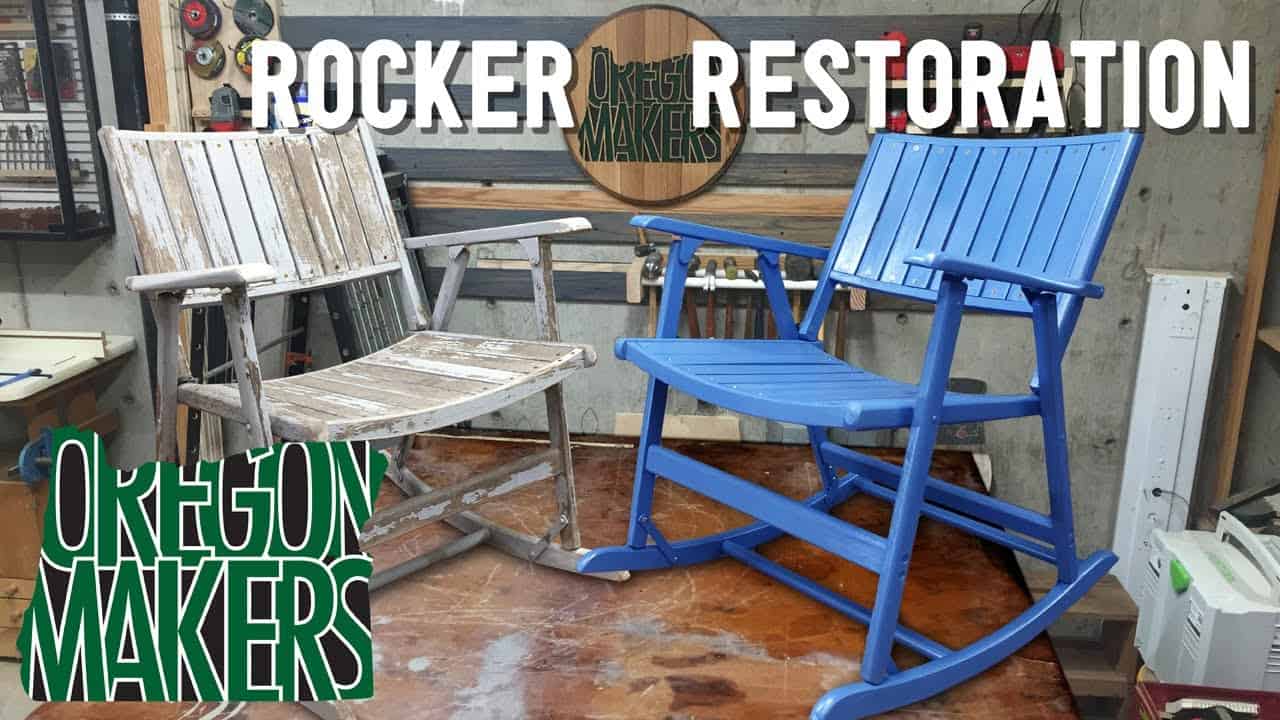This project was built and designed by Mike from Oregon Makers. It’s a thoughtful restoration of a well-loved folding rocking chair that had endured years of wear from use and coastal exposure.
Mike takes a patient, practical approach to renewing the chair—preserving its character while upgrading its durability. The final result blends history and function, showing how even damaged furniture can be brought back to life with the right process.
Watch the full video and subscribe to Mike’s channel:
Breathing New Life into a Classic
This chair wasn’t just an old piece of furniture—it had sentimental value to the owner. While the peeling paint and rusted hardware made it look beyond repair, Mike saw potential in its structure and story.
Rather than fully stripping the chair to bare wood, he chose a restoration path that honored its age. The goal was to retain the worn charm while making it structurally sound and visually appealing again.
Starting with Disassembly
The first step in the process was taking the entire chair apart. Because this was a folding rocker, there were several moving parts and slats that needed to be removed carefully to avoid damage.
Many of the screws were badly rusted, which is common in coastal environments. Mike used a specialized screw extractor to remove the stubborn hardware, though some screws had to be drilled out entirely due to corrosion.
Working Around Rust and Damage
In cases where the screws were too far gone, Mike carefully cut them off with a rotary tool. These areas were then prepped for new hardware installation later, including stainless steel replacements to resist future rust.
As each part was removed, Mike made sure to mark their orientation and placement. This made reassembly smoother and preserved the original layout of the chair.
Choosing Preservation Over Perfection
Instead of sanding the entire piece to fresh wood, Mike intentionally left traces of the original paint. He believed the wear told a story, and stripping it away would remove part of the chair’s identity.
Cracks and minor imperfections were filled as needed, but the focus was on stabilizing the structure, not making it look brand new. This balance between repair and character is what made the restoration feel authentic.
Prepping the Surface for Paint
Once the repairs were complete, Mike moved on to prepping the surfaces for painting. Denatured alcohol was used to remove dust, oil, and debris from sanding and handling.
The chosen color was a deep navy blue—a striking choice that added elegance without losing the vintage appeal. Mike noted that the shade looked darker than expected at first, but it created a dramatic, rich finish when fully dry.
Painting Around Folding Components
Painting a folding chair presents unique challenges, as many areas shift or become hidden depending on the position. To work around this, Mike painted the chair in both fully open and partially folded positions.
This ensured that every visible surface received even coverage. Multiple coats were applied to build up a smooth, protective finish that could withstand outdoor use.
Reassembling the Chair with Care
With the paint dry, it was time to put the chair back together. Mike had labeled each slat and screw position during disassembly, making the process more efficient and accurate.
Each screw was inserted with attention to tension and movement. For a folding chair to function well, parts must move freely but stay secure. Mike adjusted as needed until the rocker operated smoothly.
Upgrading with New Hardware
One of the most noticeable upgrades was the switch to stainless steel hardware. Not only does it improve weather resistance, but the shiny finish adds a modern accent to the classic design.
Mike also reused what he could, blending old and new hardware where appropriate to maintain the original look while improving functionality.
A Chair Restored and Ready for Use
The finished chair is both functional and beautiful. Its dark blue color stands out against the natural wood grain that remains visible in some areas, creating a layered, textured look.
What was once a rusty, peeling rocker is now a sturdy, eye-catching piece ready for another decade of use—this time with stainless steel bolts and a finish designed to last.
Restoration Done Right
This project is a great reminder that restoration isn’t always about making something look brand new. Sometimes the best result comes from preserving what’s there and building around it.
Mike’s method shows how old furniture can be saved with patience, simple tools, and thoughtful decisions. The folding rocker now has new life, and more memories ahead.
Watch the full video and subscribe to Mike’s channel:
